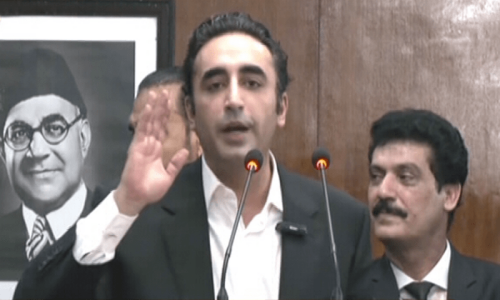QUETTA: In an attempt to put all speculations regarding a purported extension for Chief Justice of Pakistan Qazi Faiz Isa to rest, PPP Chairman Bilawal Bhutto-Zardari on Tuesday said his struggle for constitutional courts was not for the sake of one individual rather aimed at arresting delays in the delivery of justice.
The PPP chairman also made it clear that his demand for constitutional courts was not new, pointing out that the creation of such a court would allow the judiciary to pay attention to constitutional matters without compromising on the cases of the common man.
Mr Bhutto-Zardari, who was on a two-day visit to Quetta, expressed these views while addressing the Balochistan High Court Bar.
History was witness to the fact that judges did not allow parliament to draft laws concerning the judiciary, but looked the other way when military rulers amended the constitution, he said, explaining that the judicial reforms would also ensure accountability within the legal community.
Pakistan needed constitutional courts at federal and provincial levels, he said, highlighting the need to put an end to the concept of ‘sacred cows’ within the judicial and military systems. He warned that discussions about setting up of military courts would resurface if the judicial system did not improve. Military courts were proposed when the judiciary was deemed incapable of bringing terrorists to justice, he added.
In this situation, the demand for constitutional courts was not an attempt to target one specific judge but a necessary reform that the country needed, the PPP chairman said, adding that the goal was to ensure a judiciary that functions independently and provides justice efficiently.
“PPP is committed to seeing these reforms through and will continue its struggle to ensure that justice and democracy prevail in Pakistan,” he said.
Lauding the sacrifices and struggle of lawyers in Balochistan for strengthening the democracy, he said the judiciary should be free from the influence of any entity that wears a uniform or wields a weapon.
He said he had a deep connection with the lawyers of Balochistan and recalled that he visited Quetta for condolence after the terrorist attack on lawyers but his tears were met with ridicule at that time.
He reminded them that his party’s journey did not begin with the toppling of Imran Khan’s puppet regime in a constitutional way through a no-confidence motion, but the untiring efforts by three generations of his family and party workers were all aimed at strengthening parliament. This struggle was not a quick revolution achieved in a day or a year rather a persistent fight, he remarked.
He said Benazir Bhutto struggled for over 30 years to restore the 1973 Constitution in its true spirit, though she could not see it happen in her life. Through the Charter of Democracy, she signed, the PPP later succeeded in restoring the 1973 Constitution via 18th Amendment, he added.
While sharing the hardships his family and party workers endured for the sake of democracy, Mr Bhutto-Zardari recounted the execution of Zulfikar Ali Bhutto, imprisonment of Benazir Bhutto, workers of the PPP and other democratic parties. He, his sibling and mother had to wait outside jail in extreme heat in order to meet his imprisoned father, he recalled, expressing disbelief at the PTI claims that they understood Bhuttos’ struggle better than he did.
He blamed the judiciary, military, and intelligence leadership of that time for conspiring behind the scenes fearing that the restoration of the constitution would reduce their influence over the democratic system.
He acknowledged the difficult times Pakistan was facing at present, but reminded the lawyers that the situation was equally dire during the era of a dictator who could not be spoken against.
He criticised the misuse of contempt laws to silence criticism of the judiciary and condemned how courts allowed military rulers to make unconstitutional amendments but denied elected representatives the same powers.
While arguing for judicial accountability and reforms in the appointment process of judges, he spoke against the ongoing interference in parliamentary matters by other institutions. He said it a matter of concern that the judicial reforms were being undermined and questioned whether delays in reforms would lead to decisions similar to Article 63(A) and further restrictions on constitutional amendments.
Published in Dawn, October 2nd, 2024
















































Dear visitor, the comments section is undergoing an overhaul and will return soon.